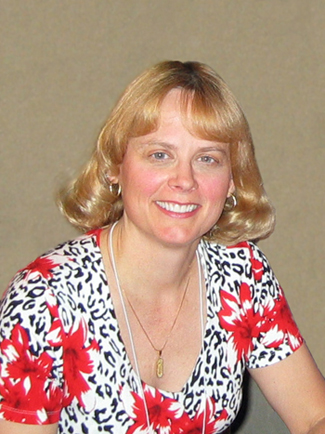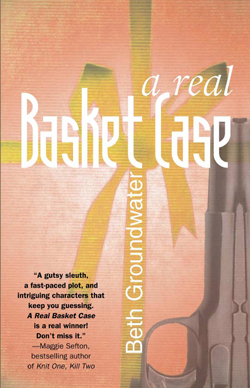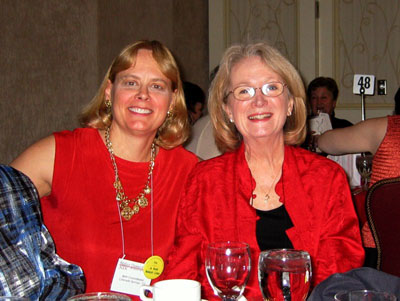 |
Beth Groundwater
Beth Groundwater's debut mystery novel, A Real Basket Case , was released in hardcover by Five Star Publishing in March, 2007. It has garnered good reviews from Booklist, Kirkus Reviews, and other publications and will be released in a large-print edition by Wheeler Publishing in January, 2008. Also, Beth has published eight short stories, including one in Wild Blue Yonder, the Frontier Airlines in-flight magazine, one which was translated into Farsi, and one which was performed live on stage. Beth is a big believer in networking and is an active member of Mystery Writers of America, Sisters in Crime, Pikes Peak Writers, Rocky Mountain Fiction Writers, and the Short Mystery Fiction Society. Between writing spurts, she defends her meager garden from marauding mule deer and wild rabbits, and tries to avoid getting black-and-blue on the black and blue ski slopes of Colorado . Beth has loved to read since she was a child and reads at least two novels a month. She savors those monthly meetings with her Book Club, and not just for the gossip and wine! Visit her website at bethgroundwater.com and her blog at bethgroundwater.blogspot.com. In A Real Basket Case, The best friend of Claire Hanover, 46-year-old proprietor of a Colorado Springs gift basket business, arranges for a handsome young massage therapist to give Claire a massage. When he's shot and killed in her bedroom and police arrest her husband, Roger, for the crime, Claire must convince Roger she wasn't having an affair and, with advice from a PI friend, find the real killer before Roger loses his job and goes to trial. Claire confronts the victim's fiery ex-girlfriend, his drug-dealing cohorts, and the gym ladies he supplied with cocaine or seduced for money. She must extricate herself from under a drug dealer's bed while he seduces his girlfriend, from jail--charged with breaking and entering, from a drug boss's limousine while he berates her for "messin' in his business," and from her angry aerobics classmates when they discover she suspects them. She makes mistakes at every turn, but she perseveres. Will she find the real murderer before Roger loses his job and goes to trial? Can she convince her husband to come back to her? Or will the killer get to her first? If you've heard about the distinction between "plotters" and "pantsers" (those who write by the seat of their pants), as a former software engineer, I'm squarely on the plotting side. I profile my characters and prepare a detailed scene outline before I start writing. Each book has a directory of its own on my computer with files for the scene outline, character profiles, interviews with experts, research notes, the current manuscript, discarded bits that I don't want to throw away yet, backups of older versions, the acknowledgements page, change requests from the editor, etc., etc. Then there's the cardboard magazine file holder stuffed full of paper research materials.
I like to have at least 4-5 suspects, especially if I'm going to kill one off sometime later in the story. J And each of those suspects has to have a motive and either means or opportunity or all three. Also, I try to have at least the same number (4-5) of clues and red herrings. A clue pointing to one suspect can be a red herring pointing to another, or a clue could point to more than one suspect, or … any number of variations. Coming up with those variations is part of the fun. I'll list my clues and red herrings in my scene outline, and I'll develop at least partial character profiles for all my suspects. A potential pitfall for a plotter is sticking too close to your plan when it's better to let creativity veer off in a new direction. When that happens and I like the new direction (and it still gets me to the desired ending), I re-plan and stick in a new scene or modify existing scenes in the outline, so I know where I'm going, then continue on. I've found that often in a mystery, the hardest things to keep track of are 1) who knows what when and 2) what's happening off-scene to the other characters at the same time your on-scene characters are acting. So, I often include notes about these things in my scene outline.
Different writers start in different ways. Some start with the character of the sleuth, some start with a setting. I usually start with an idea about the victim and some interesting or unique way in which s/he was killed. For A Real Basket Case , I had a "What If?" inspiration: What if a man is killed in a married woman's bedroom and her husband is found holding the gun that shot him, but he didn't do it and the woman wasn't having an affair with the victim? That led to all kinds of questions that had to be answered, like how the man got in her bedroom and how the husband got hold of the murder weapon. Then, I made it even harder for myself by clothing her in her underwear and spraying gunshot residue on the husband's hand. It took me quite some time to ponder that out! First I developed a love of reading. I devoured books as a child, and I still try to read about one a week. You can't be a writer without first being a reader. The first stories I remember writing were those I wrote in fifth and sixth grade about a boy named Freddie who had wild adventures such as visiting an underground mole city after burrowing down in a giant screw-mobile. During my high school senior year, I took an independent study in English and wrote fiction and poetry, which was critiqued by a college professor. Then I buckled down and focused on the technical writing I needed for my college work and career until the late nineties when I began experimenting with fiction again.
Sure there are times when cranking out a whole novel is a slog, but to me the real fun is when I get to know the characters so well, they speak to me. Then, I can throw a couple of characters into a situation, give them each a goal, and sit back and just record what they do and say to each other. That's when I'm “in the zone”. The creative juices are flowing, my fingers are flying on the keyboard trying to keep up with the argument, or the fist fight, or the chase, and I'm loving it! My first published short story, “ New Zealand ”, is still one of my favorites. It was based on my father's desire to travel to the country, and it was written from the heart. I would not change a thing about it. It was selected via a contest to appear in Rocky Mountain Fiction Writers' first short story anthology, entitled Dry Spell: Tales of Thirst and Longing, in September, 2004. I've become more self-confident. At first, I sweated writing a short story. Then, I never dreamed I would complete a whole novel. Once the first one was written, I thought, okay, I'll never be able to do that again. Now, after writing a dozen short stories, a novella, and four novel-length manuscripts, I finally believe it's not a fluke, that yes, I'm a writer, and I'm not so bad at it! J What has helped me most along the way is networking with other writers by joining writing organizations, going to conferences, taking workshops, volunteering, and most importantly, participating in a critique group. Without the advice and support of fellow writers, I know for a fact that I would not be published today.
1) Join a critique group and listen very closely to what other writers are telling you about your work. If you need to go back and study some aspect of the craft, do it. I spent a year focusing on my weak spot, character development, and now readers tell me that's what they like best about my writing. 2) Set measurable goals, make out a weekly plan for how to meet those goals and report to someone weekly on your progress. 3) Remember that your words are not golden and that your critique partners and editors have the same goal you do—to improve your writing until it's publishable. Be willing to change anything to make a story work. I spend about three months researching, profiling my characters, and preparing a detailed scene outline before I write my first draft. Then I'll spend five-six months writing the first draft, set it aside for few weeks, then start editing for a number of months. So, about a year seems to be the minimum for me.
Too many to count. No one sees my first draft! After writing the first draft, I'll go back and do some major editing passes: 1) for each major character to make sure s/he is consistent, 2) for the plot timeline and who-knew-what-when to prune out logic errors, 3) for the setting descriptions to make sure I've described things well enough and touched all the reader's senses. I'll edit each chapter before my critique group sees it, then I'll edit each one after I get their comments. Also, I'll usually exchange full manuscripts with another author to look for pacing and other large-scale problems that can't be picked up a chapter at a time. Finally, I'll do a fine-combed line-edit where I look at word choice, grammar, etc. Then, after a publisher accepts the manuscript, the process will start all over again!
Writing the rough draft. It's also the most fun, for the same reason—it requires the most creativity and problem-solving and therefore takes the most out of me. In the mystery genre, my favorite author is Sharyn McCrumb, and I collect her books. My favorite literary books are Bel Canto by Ann Patchett, The Curious Incident of the Dog in the Nighttime by Mark Haddon, The Kite Runner by Khaled Hosseini, and The Time Travelers Wife by Audrey Niffenegger.
I'm greedy. I want them all. If any of the three elements is lacking, I don't enjoy the book.
It's really hard for me to evaluate my own writing. I look for others to do that for me. I think I'm best at dialogue, but my readers might disagree.
The two hardest parts for me both involve character motivation. Since I write amateur sleuth, the first problem that has to be solved is why this person is investigating a murder versus turning it over to the police, where it belongs. My answer is to usually have the murder directly affect the sleuth or someone she loves. Secondly, I think the killer has to have a really good motivation to murder someone. One thing I hate in mysteries is a flimsy excuse to go out and shoot someone. Sure, it happens all the time in real life, but those aren't planned murders, which is what mysteries are all about.
Make sure both your sleuth and the killer can answer, “WHY did you do that?”
I'm very into Claire Hanover's (the protagonist of A Real Basket Case, and the to-be-published sequel, To Hell in a Handbasket ) world, because I live there. Colorado Springs , Colorado , where I live, is the setting for the first and Breckenridge , Colorado , where I have a ski home, is the setting for the second. I used real places in the books whenever I could because it enhances the reading experience for people who live in or have visited the cities. Where bad things happen, I make up a location that's a blend of reality and fiction. And to me, Claire is a real person. I would not be surprised in the least if she walked up to me in the grocery store one day and said, “Hi, I'm Claire.” The scary part of doing a series is putting everything you can think of into the first book, because you can't hold back. Then you have to do it all again in the next one, and the next. In each book, your protagonist should travel through an arc where she learns something or changes in some way. My solution so far has been to include in each book an internal plot of a personal relationship problem that must be solved as well as the external plot of solving the mystery.
Most of my short stories are mainstream, and only two so far have been mystery. Why, I don't know. I tried writing a science fiction novella, and that was enough to tell me that the world-building required is too much work for me. My first novel-length manuscript was a futuristic romantic suspense, which will probably never be published. I felt uncomfortable writing the sex scenes, though my critique partners told me I did them well. So, romance is not my bag either. When I wrote A Real Basket Case, I knew I'd found my genre. I'm a puzzle-freak and mysteries are all about creating and solving puzzles.
Read and write. Read the books in the genre you want to write so you know what types of stories are selling. And force yourself to write every day.
I love fan mail from readers, and I'll never get enough of it. So, please, if you've read A Real Basket Case and enjoyed it, go to my website at www.bethgroundwater.com , click on “Contact Me,” and let me know! After years of collecting rejections, hearing that someone really enjoyed my book is absolutely thrilling. Most of my readers liked the fact that they didn't guess “who done it” until it was revealed to them. Yes, I've developed friendships with mystery readers who I've met in person in town and at mystery fan conventions. I'm a mystery fan, too, remember!
Since I've only published the one, all I can talk about is the pre-publication part of subsequent books. I'm waiting for contract acceptance on the sequel, To Hell in a Handbasket, right now, and I can tell you, the uncertainty is just as agonizing as for the first one. Also, my agent has started submitting the first manuscript in a new series to publishers, and I'm antsy and anxious for that baby to be accepted, too. I can tell you this, each sale will be celebrated with a bottle of champagne, no matter how many there are! My first goal was to publish a book with a traditional publisher who paid me for my words. Now that I've met that goal, my second goal is to not be a one-book-wonder. Once that goal is met, I'll set another.
Everyone loves puzzles, right, and that's what mysteries are, a puzzle in story form. Because there are so many types of mystery readers. There are those who like blood and guts and those who don't, those who like to read about how the pros investigate murders and those who like to envision themselves being able to solve a crime, those who like reading about their hobby or sport and those who like learning about a period in history or a part of the world they've never visited. Tell us about your most recent book. A Real Basket Case started like most of mysteries do, with the discovery of the body of the massage therapist—in Claire's lap. J Then I start wondering why the therapist died the way he did and who might have killed him. Over the period of a few weeks, other scenes developed. When I had visualized the ending where the killer is discovered and nabbed and at least one big scene that was going to hold up the infamous sagging middle, I started plotting. A Real Basket Case also gave me a vehicle for exploring the middle-aged marriage and how couples need to work to keep that spark alive after the nest empties and their life roles change. I've seen too many marriages fail needlessly because that work wasn't done. Besides Claire, the protagonist, my favorite character is Leon, the drug boss. For some reason, he sprang fully developed from my imagination, and I never had any problem visualizing what he was going to say or do. In fact, because of his powerful, flamboyant personality, Leon often tried to take over whatever scene he was in, and I would have to tamp him back down and cut out some of his dialogue to maintain Claire as the lead player. The hardest character for me to really get to know was Claire's husband, Roger. Finally, when I pretended to be his trusted psychologist and conducted a first-person interview with him, his anger, fear, guilt and deep, deep hurt over his belief that Claire had been unfaithful to him ultimately was revealed. For those who are fans of the The Writers Journey by Christopher Vogler, you'll recognize what I mean when I say that my favorite scene in the book is when Claire is in her Inmost Cave, facing her Ordeal or Central Conflict. And Claire's cave is literally a cave—hiding under a drug dealer's bed while he seduces his girlfriend. And things just get worse, a lot worse, from there. |
|
|
Past issues and stories
pre 2005.
Subscribe to our mailing
list for announcements.
Submit your work.
Advertise with us.
Contact us.
Forums, blogs, fan clubs,
and more.
About Mysterical-E.
Listen online or download
to go.
|
|
|
 |
 |




